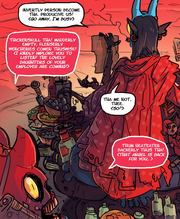The Black Speech[1] is a lect of Universal Metaconstant spoken exclusively by devils.
Description[]

Strings of words can be used to convey simple messages.
At a surface level, Black Speech appears to be mostly gibberish, like an archaic or corrupted version of English laced with profanity and euphemisms. It contains non-standard features like the second-person singular pronoun "tha" and a variety of adjectives ending in the suffix "-ly". To demonstrate, consider the following dialogue:
- Number 1: Waken tha sleepmonger! (Watch out!)
- Cio: Invertly person become tha. Producive us! (Go away, I'm busy.)
- Number 1: Thickenskull tha! Madderly empty, flenserly wencheries comen thuswise! (I kindly implore you to listen! The lovely daughters of your employer are coming!)
- Cio: Tha me not, thee. (So?)
- Number 1: Thum heateater backerly thus tha. (That angel is back for you.)
- Cio: Blasted poxerly vacuous gaperly whoreson! Wretchly malodorous molleycoddle! Tha fumorous discharge! (What? I am discontent with this news!)[1][2]
Grammar[]
Unlike traditional English, Black Speech makes heavy use of inflection through prefixes and suffixes. In this sense it is reminiscent of Early Modern English, containing odd substitutions and word combinations that form a complex sentence structure.
Pronouns[]
- "Us" is often used in place of "I", "we", "our", or "my". When used as a subject, the corresponding verb tends to end in -s or -es, as seen in the phrase, "Us's not a dead dog."
- "Tha" is used as a second-person singular subject pronoun in place of "you". The corresponding verb tends to end in -s or -es, rather than -st.
- "Thum" is used in place of "they" or "that".
- "Thee" has also been seen, and might be used as the corresponding object pronoun, as it does in archaic English.
- The pronoun "you" takes the place of "tha" when speaking in a formal context.
Verbs[]
- It is common to drop the verb "to be" and place the subject at the end. ("Thickenskull tha!")
- Verbs with plural subjects may take the ending -en, as seen in the phrases "Flenserly wencheries comen thuswise" and "Plucken you thon needle out of her head!" The infinitive appears not to take this suffix.
Adjectives[]
- The suffix -ly or -erly may be applied to form adjectives.
- A common way of forming adjectives is adding the suffix "-some" to a word, such as "yawnsome" to mean "boring". While this is present in English as well ("worrisome"), the Black Speech uses it to a far greater extent.
Adverbs[]
- The suffix "-wise" is frequently used to form adverbs, such as in the sentence "Gather tha chopwise!", meaning "get going quickly" or "wellwise" to mean "well done".
Word order[]
- Like everything else about the Black Speech, word ordering is highly flexible, but a peculiar object-verb-subject ordering is very common. For example, the sentence "Invertly person become tha" ("go away", but literally "become a person facing away") follows this order (object: invertly person, verb: become, subject: tha). This order is also seen in simpler sentences, such as "Leaving us!".
Vocabulary[]
Most of the vocabulary in Black Speech remains consistent with modern English. The key difference lies in how words are used. For example, a string of profanity (Blasted poxerly vacuous gaperly whoreson!) can be translated as "What?!" and the language tends to use idioms and draw on imagery to convey messages. The word for "angel", for example, is "heateater".[2]
Unlike English, Black Speech also has a way to construct new words on the spot using prefixes and suffixes, or even idiosyncratic compound words (such as Oscar's use of the word "mumswear").
